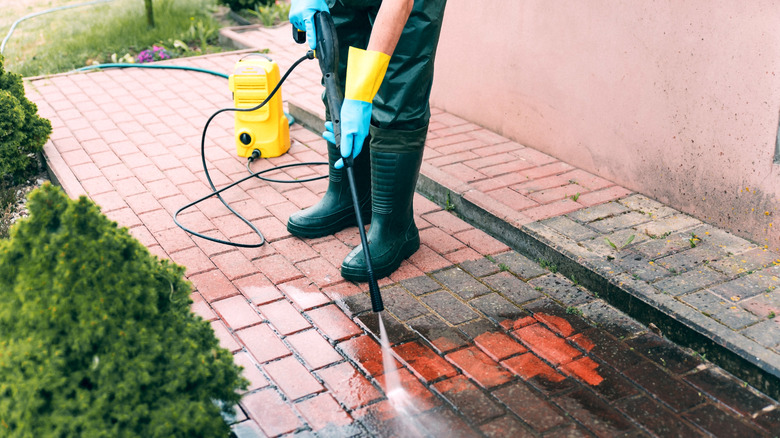5 Things To Consider Before Renting Your House Out To Long-Term Tenants
Renting out real estate is a great way to earn passive income. However, it comes with a lot of challenges that can lead you to wind up on the losing end if you don't do it right (via Business Insider). Really, there's a thin line between a successful and unsuccessful landlord, and the difference can come down to doing the right research.
Being a landlord comes with a lot of responsibility and expectations to be met for the new occupant. Especially as it's your first time, you must be equipped with the necessary information to give your tenant the best and ensure the safety of your property. A good way to stay safe is by getting landlord insurance that will cover the costs of damages on your property (per Evernest). Likewise, tracking all your expenses is essential to avoid overspending. It's important to make the house comfortable, but you don't want a rental unit to become a money pit. To avoid other problems associated with being a landlord, here are some tips to help guide you in renting your space out to a new tenant.
Come prepared
Renting to long-term tenants comes with a lot of responsibility and maintenance. One of the ways to prepare is to learn the state laws regarding rentals so that you know exactly what you are accountable for. According to Nolo, laws vary by state and guide the landlord-tenant relationship. For example, Fair Credit Reporting Act helps keep the potential tenant's information safe. Other laws cover things like when the landlord is allowed access to the property. If you need guidance, it's best to discuss with a legal practitioner (via Legal Match).
You also want to consider preparing for the selection process, especially if you run a tight schedule. Be ready for several checks on the apartment, meeting strangers often, drafting marketing strategies, and endless discussions to reach an agreement during this period. You have to know it's a huge responsibility that requires proper thought. If handling these tasks isn't realistic, you should consider hiring an apartment management company to do the job on your behalf.
Also, you need to draft a target amount of expected rent. If possible, get professional advice from an estimator, ask around and compare prices. This will help you benefit maximally from your property. Knowing the value of similar properties in the area is vital to finding willing tenants.
Get the necessary certifications
As a first-time landlord, there are lots of costs you should be prepared to handle as a form of preparing ahead for your new tenants. Although these costs vary, you always need to know the general legal requirements for your area. One of the certifications you need is the Gas Safety certificate that gives you the license as the landlord of the house to perform annual checks on the functioning of the gas appliances in the home (via Fantastic Services). With this, you will be responsible for ensuring the quality maintenance of your home and its appliances.
Some states or jurisdictions will require that you get a landlord license or appoint someone with a license to oversee the property. However, you need to find out if your jurisdiction requires one and the steps to securing it through a professional to avoid being penalized, says Newbold Solicitors.
Make your home fit for the new occupant
As the landlord, the maintenance of your home is in your care. Whether your apartment has been previously occupied by an ex-tenant or by you, you will need to change some damaged areas, especially wall cracks, deck stains, leaks, etc., before renting your house to new tenants (per Investopedia).
While trying to make your home fit for the new occupants, you need to consider the repair options available. For minor fixes, pick up the tools and become the handyman. This way, you're saving some bucks on maintenance. Otherwise, get a company hired for the job.
Additionally, you need to consider the potential tenants of the house and their needs. Professionally, this is known as the implied warranty of habitability. This law states that your apartment should be comfortable for the incoming occupants. For example, consider installing a working heater, cooling system, etc. Remember also, the worth of your home depends on the beauty, availability, and general maintenance level, so pay attention to the things that may hinder your house from being well-valued by the applicants.
Draft effective marketing strategies
Like everything else, effective marketing strategies can help you land the right tenant for your property. The first advertising strategy is informing your neighbors, friends, and colleagues (via Rent Prep). Guess what? Your potential new tenants may be one of them or someone close to them.
Also, there are tons of online advertising sites available for you to list your rental vacancies. According to The Balance Small Business, rental listing sites are a go-to for most homeowners seeking a new apartment, and some even help value your property. However, you need to understand that referrals from these sites must be subjected to proper scrutiny before acceptance.
In addition, your social media pages can serve as a space to reach out to a large audience for inquiries from potential tenants, writes Landlord Space. Before getting started, ensure you draft a good marketing campaign for the adverts and stick to the relevant keywords for search engine optimization. Examples of popular keywords are home for rent, property, realtor, etc. (via Fit Small Space). Upload the vacancy notice with good pictures of the apartment, showing the major areas of the home for better results.
Do your research
This tip is the most critical of all we have mentioned in this article. Before selecting your new tenant, you should conduct background research to ensure they have a clean record. No doubt, there will be lots of checks by willing tenants, but screening will streamline the list to give room for better decisions on who to select for your apartment, says Bay Property Management Group.
During the screening process, you can include an application fee for serious-minded applicants. According to Apartments.com, this helps with the running costs of back and forth checks on the apartment. However, it's up to you to decide the price and the necessity to charge this fee.
While screening the potential tenants, ask for their references. It's one of the best ways to confirm their identity and ensure they aren't involved in criminal activities. If possible, contact their past landlords to get a report on their behaviors. Likewise, do a background check on their employer and company. In addition, ask for identity from the potential occupants with their credit history. You may never know about false information from some until you ask for their identity. Before you can access their credit history, ask for their permission and social security number, says All Business.






